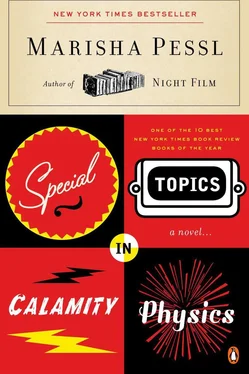The stairs were empty, and below, in the whirlpools of people, some sweaty bird in a crooked feather headdress was screeching something, a hysterical “Ooooooooo” that went on and on, cutting through the noise like a sword during any climactic fight scene. Charlie Chaplin was trying to restrain her. “Breathe! Fuckin’ breathe, Amy!” Nigel and I glanced at each other, baffled, then continued down the stairs, only to find ourselves drowning in a flood of feet, plastic masks, tails, wands, wigs, all of them trying to shove their way toward the back door, out onto the patio.
“Stop pushing!” someone shouted. “Stop pushing, motherfucker!”
“I saw it,” said a penguin.
“But what about the police?” wailed a fairy. “I mean, why aren’t they here? Did someone call nine-one-one?”
“Hey,” said Nigel, grabbing the shoulder of the merman pushing in front of us. “What’s going on?”
“Someone’s dead,” he said.
When he was seven years old, Dad almost drowned in Lake Brienz. He claimed it was the second most illuminating experience of his life, trailing in significance only to one other occasion, the day he saw Benno Ohnesorg die.
In customary fashion, Dad was trying to outperform one Hendrik Salzmann, a twelve-year-old, another boy at the Zurich Waisenhaus. Although Dad “showed dogged endurance and athleticism” as he splashed past the weary Hendrik, when he was some thirty or forty meters beyond the swimmer’s boundary, Dad found himself too exhausted to go on.
The bright green shore floated far behind him. “It appeared to be waving good-bye,” Dad said. As he slumped into the gurgling darkness, arms and legs heavy as bags of stones, after an initial panic, which was “really nothing more than surprise, that this was it, what it all comes down to,” Dad claimed he felt what is frequently referred to as the “Socrates Syndrome,” a feeling of utter tranquility moments before death. Dad closed his eyes and saw not a tunnel, not blinding light, not a slide show of his short, Dickensian life, not even a Smiling Bearded White Man in a Robe, but sweets.
“Caramel truffles, marmalade,” Dad said, “Babel cookies, marzipan. I could smell them. I really believed I was falling not to my watery grave, but into a Café Conditorei .”
Dad also swore he heard, somewhere in the depths, Beethoven’s Fifth, which some beloved nun named Fraulein Uta (the first June Bug in recorded history, der erste Maikäfer in der Geschichte ) played in her room on Saturday evenings. When he was wrenched from this sugary euphoria and hauled ashore by none other than Hendrik Salzmann (experiencing a heroic second wind), Dad said his first conscious thought was that he wanted to go back, down into the dark water, for dessert and the Allegro-Presto.
Dad, on Death: “When it’s your time — and naturally, none of us know when we’ll be drafted — there’s no use sniveling. Please. You should walk out a warrior, even if the revolution you waged in your life was for biology or neurology, the origins of the sun, bugs, the Red Cross, like your mother. Might I remind you of the way Che Guevara went out? He was a deeply flawed man — his pro-Chinese, pro-Communist viewpoints were blinkered, naïve at best. Yet ”—Dad sat up in his chair and leaned forward, his hazel eyes huge behind his glasses, his voice rising up then plunging deep into himself—“on October 9, 1967, after a traitor alerted CIA operatives to the secret location of Guevara’s guerrilla encampment, after he was so badly injured he couldn’t stand and he surrendered to the Bolivian army and René Barrientos ordered his execution, after a lily-livered officer drew the short straw and, trembling so severely witnesses thought he was having a seizure, entered the windowless schoolhouse in order to put a bullet in Guevara’s head. He was going to murder, once and for all, the man who charged into battle for those he believed in, the man who said, ‘Freedom,’ and ‘Justice,’ without a hint of sarcasm, Guevara, who knew what was coming, he turned to the officer…” Here, Dad turned to an imaginary officer standing to his left. “They say he wasn’t afraid, sweet, not a bead of sweat, not the slightest tremor in his voice — he said, ‘Shoot, coward. You are only going to kill a man.’”
Dad stared at me.
“May you and I aspire to such certainty.”
After Hannah told us about Smoke Harvey, with a raw voice and a certain grayness seeping around her eyes (as if something inside her had spilled), and her every detail about him laid a pink brick in the re-creation of his big, noisy plantation of a life, I found myself wondering about Smoke’s certainty. As he drowned, I tried to imagine what it was that wooed him, if not Dad’s childhood loves of sugar and Beethoven, then Cuban cigars, or his first wife’s doll hands (“She was so tiny she couldn’t wrap her arms all the way around him,” said Hannah), or a glass of Johnnie Walker on the rocks (Blue Label probably, as Hannah said he enjoyed “the fine things”), anything to gently push him away from the fact that the culmination of his life, sixty-eight years lived with great vigor and force (“gusto” and “zest” Hannah said) was to be in her swimming pool, inebriated and dressed as Mao Zedong, drifting over a concrete floor eight feet under and no one noticing.
His full name was Smoke Wyannoch Harvey, age 68. Not many people knew who he was, unless they lived in Findley, West Virginia, or used him as a Portfolio Manager when he worked at DBA LLC, or found the book he’d written in the 80-percent-off bin, The Doloroso Treason (1999), or browsed the two articles about his death in The Stockton Observer on November 24 and November 28 (see “West Virginia Man Drowns in Pool,” “Weekend Drowning Ruled Accidental,” Local News, 2B, 5B, respectively).
He was, of course, the distinguished gray-haired man Nigel and I had met with Hannah on the stairs, the one I’d liked (Visual Aid 12.0).
After we heard someone was dead, Nigel and I pushed our way to one of the windows overlooking the patio. We could only see the backs of people, all of them staring at something in front of them, as if watching a stirring street performance of King Lear . Most of them were half-birthed from their costumes, so they looked between species, and the ground was littered with pipecleaner antennae and beached-jellyfish wigs.

VISUAL AID 12.0
Screams from an ambulance ripped through the night. Red light hurtled around the lawn. Everyone on the patio was herded into the living room.
“Things’ll go quick soon as everyone gets quiet,” the blond police officer said from the door. He chewed gum. From the way he leaned against the doorjamb, rested one foot on Hannah’s jug of umbrellas and took seconds too long to blink, you could tell his body was present, but his mind was back at some red felt pool table where he’d missed an easy draw shot, or else, back with his wife in their swayback bed.
I was in an O-mouthed state of shock — wondering who it was, wanting to make sure it wasn’t Milton or Jade or any of them (if it has to be someone, it could be that sick caterpillar) —but Nigel was acting like a Boy Scout Leader. Grabbing my hand again, he forced us across the room, stepping on the hippies who’d sat down on the floor to give each other contrition massages. He ejected a sick Jane from the bathroom (she’d lost Tarzan) and, locking the door, instructed me to start drinking water.
Читать дальше













